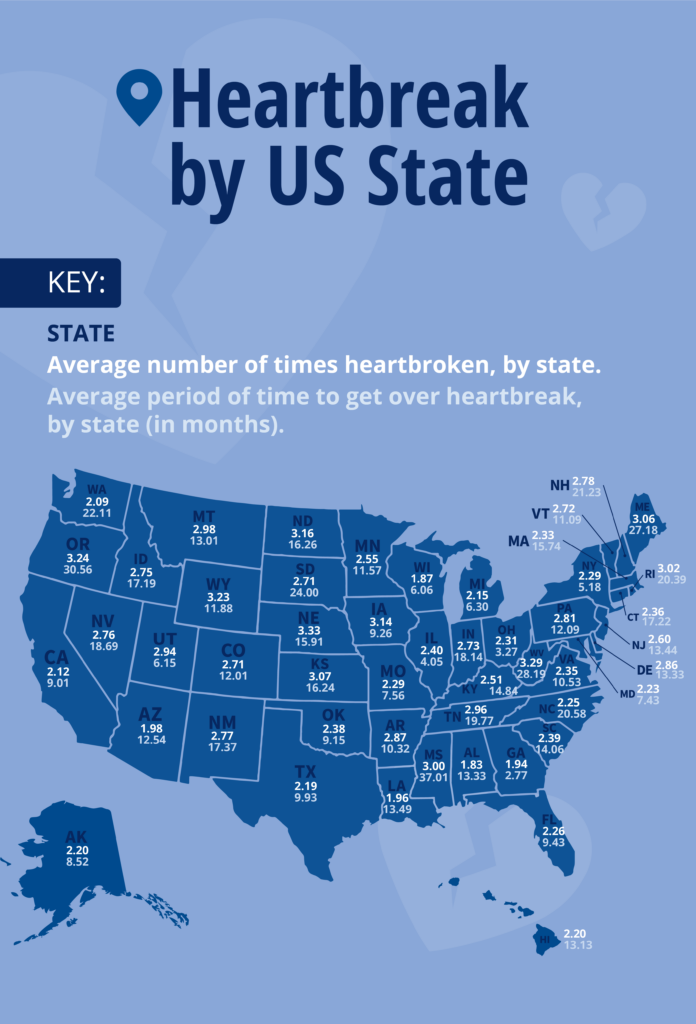Can Heartbreak Damage Your Health and Well-Being?

It’s no secret that heartbreak can be very debilitating. The emotional pain and anguish that comes with a break-up often leaves people feeling hopeless, sad, and lonely. However, did you know that heartbreak can also significantly damage your health and well-being?
While the effects of a broken heart are often considered purely emotional, the truth is that they can also affect physical health – from an increased risk of developing cardiovascular problems to a weakened immune system. Severe heartbreak can have a negative impact on your health and well-being.
What causes heartbreak?
There’s no definitive answer to this question, as heartbreak can be triggered by a variety of factors. For some people, it may be the result of a failed relationship. Others may experience heartbreak after the death of a loved one. Still others may feel grief following a major life change, such as the loss of a job or a divorce.
A recent study published in the Journal of the American Heart Association revealed that broken heart syndrome is a disease on the rise in the United States. It’s a temporary heart condition that’s often triggered by high-stress situations that cause intense emotions, such as heartbreak.
In addition, according to information from the health insurance comparator’s map, Americans tend to have between two and three major heartbreaks in their lifetime and each has a recovery period of approximately 13 months.

If you ever experience a break-up, loss, or heartbreak, you should seek help, as it could trigger a series of conditions.
The effects of heartbreak on health
When we experience the loss of a loved one, or a personal traumatic situation, the body can suffer directly as a result of this loss. Knowing how to recognise the effects of a broken heart is essential in order to seek professional care promptly.
Here are some of the physical after-effects of heartbreak.
1. Cardiovascular problems
A broken heart can affect the very health of our heart. Research has shown that people who experience a rupture are more likely to develop Takotsubo cardiomyopathy (broken heart syndrome). This is a disease that causes cardiovascular problems, such as high blood pressure and the risk of heart disease. In some cases, the emotional stress of a break-up can even lead to a heart attack.
If you’re struggling to get over a recent breakup, be sure to monitor your heart health closely. If you notice any changes in your heartbeat or experience chest pain, shortness of breath, or fatigue, then seek immediate medical attention.
Read more here: Cardiovascular Risk: How Does Diet and Exercise Help?

2. A weakened immune system
The emotional stress of a break-up can affect the immune system, making it more susceptible to colds and other illnesses. In fact, a recent report found that people who had recently gone through a break-up or bereavement were more likely to get a common cold than those who hadn’t.
So, if you find yourself going through a break-up, make sure you take good care of yourself, eat a healthy diet, and exercise regularly. But if you find that, despite your best efforts, you’re struggling to stay healthy, consider talking to your doctor about ways to boost your immune system.
3. The effects of heartbreak on health: Difficulty sleeping
It isn’t unusual to have trouble sleeping after a break-up. The emotional stress of heartbreak can lead to insomnia, and that lack of sleep can further contribute to feelings of anxiety and depression. If you have difficulty sleeping, be sure to practice good sleep hygiene habits and avoid using alcohol or drugs to cope with emotions.
4. Weight loss or gain
The emotional turmoil of a breakup can lead to changes in appetite and eating habits, which can often cause either weight loss or weight gain. So, if you lose a few extra pounds or gain weight without intentionally changing your diet or exercise routine, it may be due to the stress of a recent break-up.
5. Anxiety and depression
It isn’t uncommon to feel anxious or depressed after a break-up. Studies have shown that people who experience heartbreak are more likely to develop symptoms of anxiety and depression. If you’re struggling with these mental disturbances, it’s essential to seek professional help. There are many effective treatments available, so don’t hesitate to get the help you need.
Read more here: How to Overcome Depression Due to Infidelity
What can help you to overcome heartbreak?
There are several options to help you to cope with heartbreak and heartache, and start the healing process. First of all, it’s essential to give yourself time to grieve. It’s normal to feel sad, angry, or scared after a significant loss, and it can take some time to adjust to the new reality.
Secondly, it’s vital to look for support from our close circle of friends, family and even a professional counselor. Sharing your feelings with them can help you cope with your grief in a healthy way.
Finally, a number of self-care initiatives can help you to cope with distress. Exercise, meditation, and participating in cultural activities are excellent ways to help you improve your mood and overall health. If you feel you need help, don’t hesitate to ask for it. There are many resources and professionals available to support you through this difficult time.
All cited sources were thoroughly reviewed by our team to ensure their quality, reliability, currency, and validity. The bibliography of this article was considered reliable and of academic or scientific accuracy.
- Ennis J, Majid U. (2021). "Death from a broken heart": A systematic review of the relationship between spousal bereavement and physical and physiological health outcomes. Death Stud. 2021;45(7):538-551. doi: 10.1080/07481187.2019.1661884. Epub 2019 Sep 19. PMID: 31535594. Recuperado de: https://pubmed.ncbi.nlm.nih.gov/31535594/
- Oliveri F, Goud HK, Mohammed L, Mehkari Z, Javed M, Althwanay A, Ahsan F, Rutkofsky IH. (2020). Role of Depression and Anxiety Disorders in Takotsubo Syndrome: The Psychiatric Side of Broken Heart. Cureus. 2020 Sep 11;12(9): e10400. doi: 10.7759/cureus.10400. PMID: 32944484; PMCID: PMC7489571. Recuperado de: https://pubmed.ncbi.nlm.nih.gov/32944484/
- Pattisapu V., Hao H., Liu Y., Nguyen T., Hoang A., C. Bairey N., Cheng S. (2021). Sex‐ and Age‐Based Temporal Trends in Takotsubo Syndrome Incidence in the United States. Journal of the American Heart Association. 2021;10: e019583. Recuperado de: https://www.ahajournals.org/doi/full/10.1161/JAHA.120.019583
- Potu KC, Raizada A, Gedela M, Stys A. (2016). Takotsubo Cardiomyopathy (Broken-Heart Syndrome): A Short Review. S D Med. 2016 Apr;69(4):169-71. PMID: 27263165. Recuperado de: https://pubmed.ncbi.nlm.nih.gov/27263165/
This text is provided for informational purposes only and does not replace consultation with a professional. If in doubt, consult your specialist.








